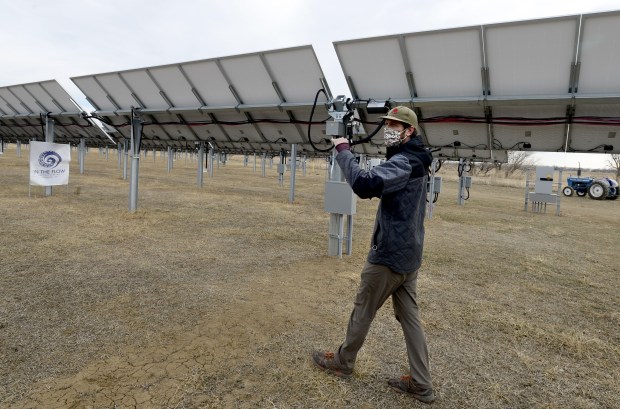Western Disposal is now sourcing about 90% of its electricity from a renewable source, thanks to a new partnership with Jack’s Solar Garden.
Western Disposal, which provides trash, recycling and compostable materials collection services in Boulder and Broomfield counties and the surrounding areas, has committed to obtaining about 15% of Jack’s 1.2 megawatt capacity. Jack’s is a family-owned solar garden based in Longmont.

It’s run through Xcel Energy’s solar rewards community program, which incentivizes businesses and residents to subscribe to nearby third-party community solar gardens by offering a credit on monthly utility bills for the solar energy their subscription contributes to the Xcel Energy grid.
Kathy Carroll, community relations manager at Western Disposal, said the partnership between Western Disposal and Jack’s was a serendipitous one. Soon after Western Disposal started discussing finding other means of renewable energy, it received an email from Byron Kominek with Jack’s Solar Garden.
Carroll said Western Disposal has a 194 kilowatt solar system on site and it buys “significant amounts” of wind energy offsets. However, it didn’t intend to install more solar on site so the company was in a holding pattern until it could find another local source.
“We are just really always looking at how whatever we do connects locally,” she said.
In addition to supporting renewable electricity, the company’s fleet is fueled by compressed natural gas, which allows Western Disposal to avoid 900 metric tons of annual carbon dioxide emissions annually. According to Western Disposal, 65% of the fleet is powered with renewable natural gas produced at Boulder’s wastewater treatment plant.
Jack’s Solar Garden is unique in that it uses agrivoltaic techniques, where the same land is used for photovoltaic solar power and agriculture. It’s known as the largest agrivoltaic system in the United States and has partnered with National Renewable Energy Laboratory, Colorado State University and the University of Arizona to research the practice.
The land has been in Kominek’s family for decades, and he said the operation relies on support from entities such as Western Disposal.
“They are supporting our activities by buying our power and that’s really helpful,” Kominek said. “That’s something we really need as a farm to be able to continue our operations is having long standing subscribers to purchase our power.”
